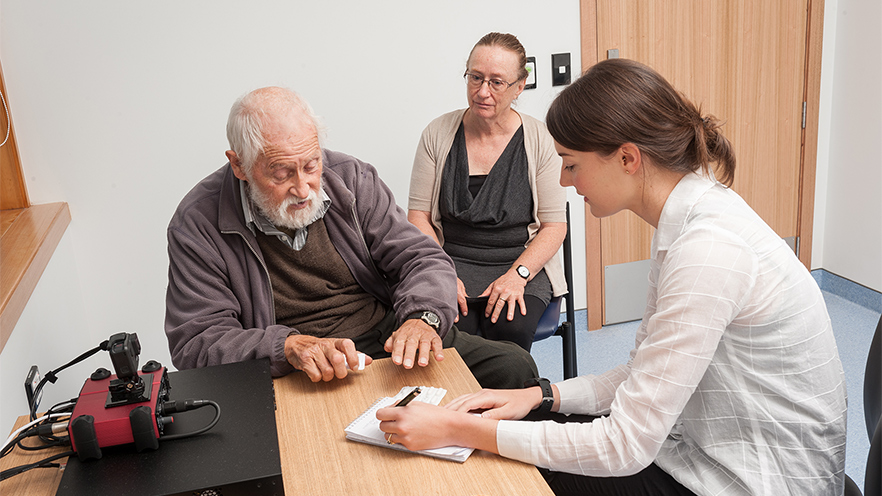“This contextualises or underpins that whole commitment we have towards developing culturally-safe practitioners.”
— Leanne Te Karu, Associate Dean (Māori)
In 2019, the School of Pharmacy built two new facilities for students, staff and patients to use for pharmacy education, research, and practice.
The Virtual Professional Practice Laboratory and Pharmacy Clinic provide innovative, modern environments that encourage new ways of thinking, learning, and educating to ensure better health outcomes for the patients and communities they serve.
Ross Hemera (Ngāi Tahu, Ngāti Māmoe, Waitaha) was commissioned to work with the School of Pharmacy – He Rau Kawakawa – to help reflect our commitment to cultural competence, to Te Tiriti o Waitangi, and partnership with the local iwi, Ngāi Tahu.
His creative works intertwine narratives of Rangi-nui and Papatuanuku with motifs representing rongoā and acknowledgments of local rūnaka.
About the artist
Ross Hemera (Ngāi Tahu, Ngāti Māmoe, Waitaha)
Ross Hemera is an established artist and designer who creates a range of art forms in painting, sculpture, drawing, design, and mixed media – referencing concepts such as whakapapa, whenua, mana, taonga, and whānau.
Now living and working in Tauranga, Ross continues a distinguished career in art and design practice, advice, education, and cultural advocacy.
Ross is a member of Ngā Aho, the Network of Māori Design Professionals, and a member of Paemanu, the Ngāi Tahu contemporary visual arts trust.
Supporting culturally-safe practice
One of the most important aspects of redesigning the lab space was to focus more on connecting with patients and being able to communicate with them.
The Virtual Professional Practice Laboratory includes a central debrief area surrounded by 10 small and intimate spaces called 'pods'. These pods are used to help students feel confident to ask questions and make mistakes in a safe learning environment.
Students use the lab to help develop their communication and techniques to understand and connect with our diverse communities. Part of connecting with people is your being able to understand different perspectives.
Developing pharmacy skills
“I wanted to create an atmosphere where students felt safe in being wrong.”
— Dr Carla Dillon, Professional Practice Fellow
- Assessing profiles of mock pharmacy patients and creating plans to achieve their health goals.
- Assessing mock prescriptions for potential safety issues (for example best dose for a patient, interactions with other medications). Collaborating with and communicating recommendations to mock prescribers and then collaborating and communicating with the patient in a way that best meets their needs to ensure they understand what the medicine does, how to take it, and how it helps to achieve the patient's health goals.
- Assessing walk-in patients' needs and recommending self-care options and over-the-counter medications that best suit the patients' needs, then ensuring patients understand what their medicine does and how to take it.
- Performing health screening and monitoring (for example, taking a patient's blood pressure or blood sugar level).
Pharmacy Clinic / He Rau Kawakawa Whare Haumanu

A consultation at the Pharmacy Clinic in Great King Street.
Our new Pharmacy Clinic aims to optimise pharmacotherapy and improve patients' health. Practitioners work with patients and their health care providers to help them manage multiple medications and improve their health.
The Clinic is believed to be the first of its kind in Australasia.
The Clinic not only provides benefits for patients, but also for pharmacy students – who will have opportunities to observe modern patient-focused care.
Māori Strategic Framework
“The MSF has been instrumental in helping guide practices within the school. We have a number of phenomenal staff to help direct our efforts in that regard. For us to have something visual to tie that together, gives them more visual representation and an opportunity to engage with cultural competence and safety.”
— Professor Carlo Marra, Dean
The Māori Strategic Framework is the University of Otago's guide to:
- Deepen the University's commitment to achieving equitable Māori participation and success rates in tertiary education
- Champion an environment in which scholarship and partnership will flourish to advance Māori development aspirations; and
- Set and pursue ambitious goals around embedding mātauranga Māori within the University's core functions
Background
The first iteration of the Māori Strategic Framework, launched in 2007 (and updated in 2017), was a landmark for the University of Otago.
The Māori Strategic Framework upholds the mana of Te Tiriti o Waitangi, while making concrete the university's commitment to Māori advancement through a set of carefully articulated goals and strategies.
Strategic frameworks
Pharmacy at Otago: Go beyond the script
Here at New Zealand's most innovative pharmacy school, we're teaching the next generation of full-scope pharmacists. Will you join us?